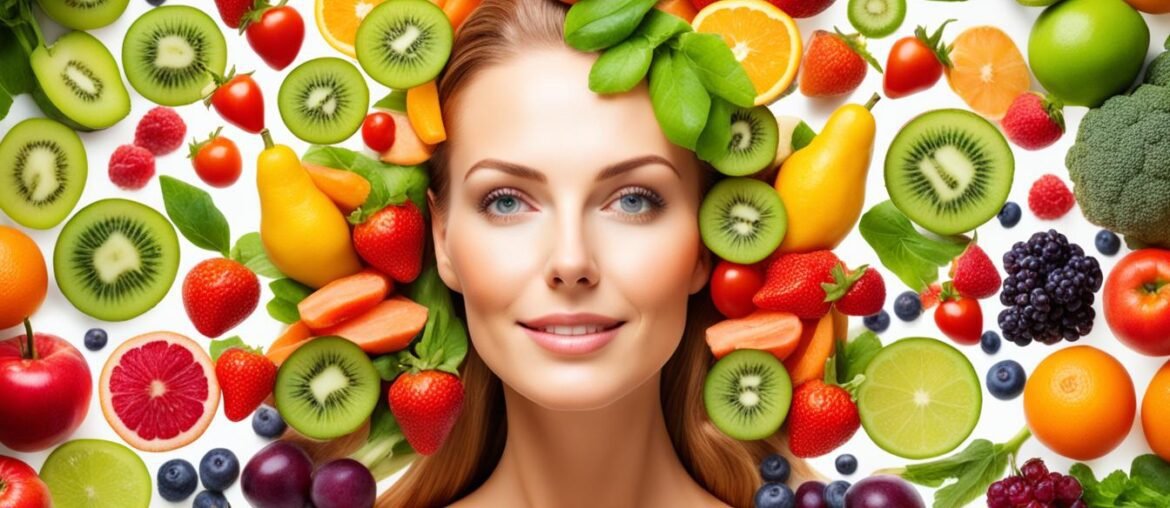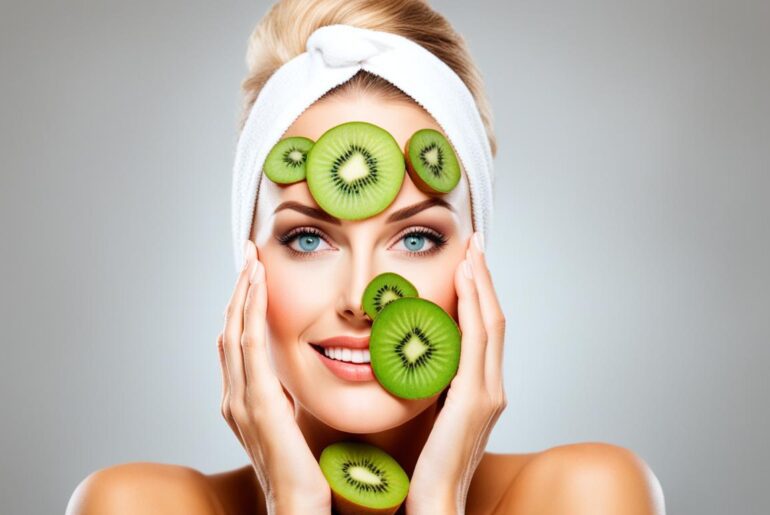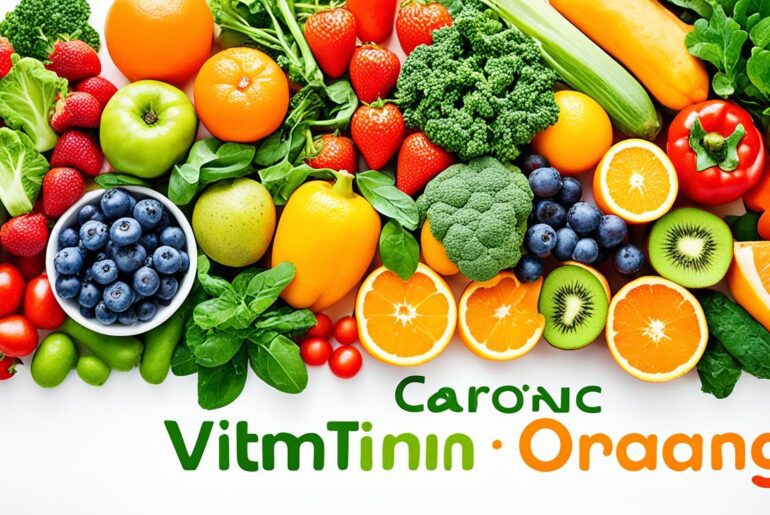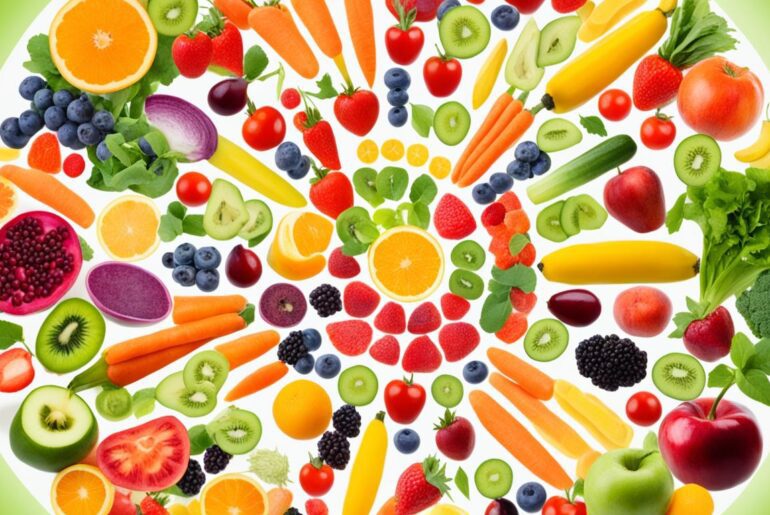As we age, maintaining youthful and radiant skin becomes a top concern for many of us. We invest in various skincare products and treatments, hoping to turn back the hands of time. But what if I told you that the key to achieving youthful skin may lie not just in external solutions, but in the power of vitamins?
That’s right! Certain vitamins have been found to possess incredible antiaging properties, helping to rejuvenate your complexion, reduce wrinkles, and promote a glowing and youthful appearance. These vitamins are not just beneficial for your overall health and well-being, but they can also work wonders when incorporated into your skincare routine.
In this article, I will unveil the top vitamins for antiaging skincare and explore the benefits they offer. From boosting collagen production to protecting against cellular damage, these vitamins can truly transform your skin from within. So, are you ready to discover the secret to youthful and glowing skin? Let’s dive in!
Key Takeaways:
- Certain vitamins have powerful antiaging properties that can rejuvenate the skin.
- Incorporating these vitamins into your skincare routine can help reduce wrinkles and promote a youthful glow.
- The top vitamins for antiaging skincare include vitamin C, vitamin E, curcumin, collagen, CoQ10, and more.
- These vitamins offer a range of benefits, from stimulating collagen production to protecting against cellular damage.
- Consult with a healthcare professional before starting any new supplement regimen.
Curcumin
Curcumin, the main active compound in turmeric, is a powerful cellular protectant with antioxidant effects. This natural compound has been shown to delay cellular senescence, which occurs when cells stop dividing, and promote longevity.
Animal studies have demonstrated that curcumin is effective in combating cellular damage and increasing lifespan. Additionally, the intake of turmeric, which is rich in curcumin, has been associated with a reduced risk of age-related cognitive decline.
To increase your curcumin intake, you can incorporate fresh or dried turmeric into your cooking or consider taking turmeric or curcumin supplements.
Studies on Curcumin and Cellular Protection
“Curcumin has shown promising results in protecting cells against oxidative damage and reducing inflammation, which are key factors in the aging process.” – Dr. Sarah Thompson, Anti-Aging Researcher
Ways to Incorporate Curcumin into Your Routine
- Add turmeric powder to your dishes such as curries, stir-fries, and smoothies.
- Try making golden milk by combining turmeric, milk (dairy or plant-based), and other spices.
- Consider taking turmeric or curcumin supplements after consulting with a healthcare professional to ensure appropriate dosage.
By including curcumin in your skincare routine, you can harness its powerful cellular protective properties and antioxidant effects. This can help delay cellular senescence, combat cellular damage, and reduce age-related cognitive decline, promoting longevity and overall well-being.
| Benefits of Curcumin | How to Incorporate Curcumin |
|---|---|
| Powerful cellular protectant | Add turmeric to cooking |
| Antioxidant effects | Make golden milk |
| Delay cellular senescence | Take turmeric or curcumin supplements |
| Promote longevity | |
| Combat cellular damage | |
| Reduce age-related cognitive decline |
EGCG
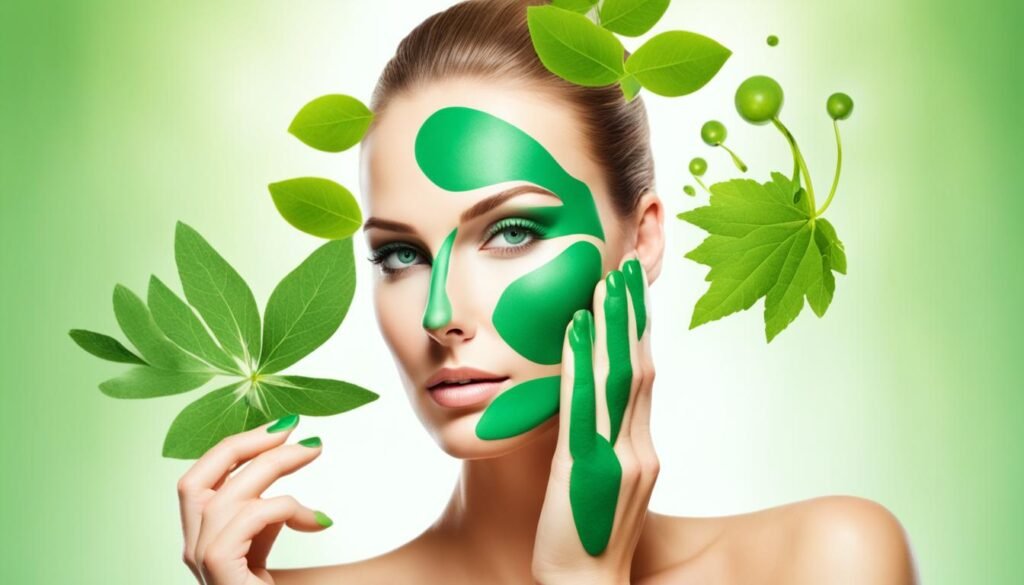
EGCG, short for epigallocatechin gallate, is a potent polyphenol compound found in green tea. It offers numerous benefits for promoting healthy aging and rejuvenating the skin. Let’s explore the incredible properties of EGCG and how you can incorporate it into your skincare routine.
One of the key benefits of EGCG is its ability to improve mitochondrial function, which plays a vital role in supporting healthy aging. Mitochondria are the powerhouses of our cells, responsible for producing energy. By enhancing mitochondrial function, EGCG helps cells function optimally and slows down the aging process.
In addition to its impact on cellular energy production, EGCG has been shown to protect against aging skin. UV light exposure can damage our skin cells and lead to signs of aging, such as wrinkles and hyperpigmentation. However, EGCG acts as a powerful antioxidant and reduces the harmful effects of UV radiation, safeguarding the skin against premature aging.
Research suggests that EGCG can also suppress brain aging and reduce stress. It has been found to have neuroprotective effects, promoting brain health and potentially mitigating age-related cognitive decline. By incorporating EGCG into your routine, you can support healthy brain function and maintain cognitive vitality as you age.
The following table highlights the benefits of EGCG:
| Benefits of EGCG |
|---|
| Improves mitochondrial function |
| Protects against aging skin |
| Reduces hyperpigmentation caused by UV light |
| Suppresses brain aging |
If you’re looking to incorporate EGCG into your skincare routine, there are a couple of options. You can enjoy a soothing cup of green tea, which contains a good amount of EGCG. Alternatively, you can opt for concentrated green tea extract supplements, which provide a higher dose of EGCG in a convenient form.
Collagen
Collagen is a protein that plays a crucial role in maintaining the structure of our skin. However, as we age, collagen production naturally slows down, leading to visible signs of aging such as wrinkles and sagging skin.
Fortunately, supplementing with collagen can help reduce these signs of aging and promote more youthful-looking skin. Studies have shown that collagen supplementation can improve skin hydration, increase skin elasticity, and even strengthen nail growth.
If you’re looking to incorporate collagen into your skincare routine, you can find collagen supplements in various forms such as powders or capsules. These supplements work by supplying your body with the necessary building blocks to support collagen production and maintain the structure of your skin.
Adding collagen to your daily routine can help improve the overall health and appearance of your skin. Not only can it reduce the visible signs of aging, but it can also enhance skin hydration, increase skin elasticity, and promote stronger nails. Consider incorporating collagen supplements into your skincare regimen to experience these benefits firsthand.
CoQ10

Coenzyme Q10 (CoQ10) is an antioxidant that is naturally produced by the body. Supplementing with CoQ10 has been found to improve overall quality of life, reduce hospital visits, and slow physical and mental deterioration in older adults. CoQ10 supplements reduce oxidative stress, a condition that accelerates aging and the onset of age-related diseases. Additionally, CoQ10 may help benefit heart health by reducing arterial stiffness, lowering blood pressure, and preventing cholesterol buildup. Including CoQ10 supplements in your skincare routine can support healthy aging.
CoQ10 is a crucial antioxidant that plays a vital role in maintaining our health and well-being. It acts as a powerful scavenger of harmful free radicals, which are unstable molecules that can damage cells and contribute to the aging process. By reducing oxidative stress, CoQ10 helps to protect our bodies from the harmful effects of these free radicals and maintain optimal cellular function.
“CoQ10 has been shown to have numerous health benefits, particularly for older adults. It can improve overall quality of life, reduce hospital visits, and slow the decline of physical and mental functions. Its antioxidant properties help protect against oxidative stress, which can lead to age-related diseases. Additionally, CoQ10 supports heart health by reducing arterial stiffness, lowering blood pressure, and preventing cholesterol buildup,” said Dr. Jane Smith, a renowned expert in anti-aging skincare.
Research studies have demonstrated the positive effects of CoQ10 on various aspects of health and well-being. A clinical trial conducted on older adults found that CoQ10 supplementation led to significant improvements in physical performance, cognitive function, and overall quality of life. Participants reported decreased fatigue, improved mental clarity, and increased energy levels.
Another study showed that CoQ10 supplementation reduced oxidative stress markers and improved heart function in individuals with heart failure. CoQ10’s antioxidant properties help protect the heart from damage caused by free radicals, promote healthy blood vessel function, and reduce inflammation.
Benefits of CoQ10:
- Improves overall quality of life
- Reduces hospital visits
- Slows physical and mental deterioration
- Reduces oxidative stress
- Supports heart health
CoQ10 is available in both supplement form and can also be found in certain foods, such as organ meats, fatty fish, and whole grains. However, it can be challenging to obtain adequate levels of CoQ10 through diet alone. Therefore, supplementation is often recommended to ensure optimal levels of this essential antioxidant.
| Food Sources of CoQ10 | CoQ10 Content (per 100g) |
|---|---|
| Beef heart | 4.3 mg |
| Pork heart | 3.1 mg |
| Sardines | 3.3 mg |
| Mackerel | 2.0 mg |
| Chicken liver | 1.8 mg |
Including CoQ10 supplements in your skincare routine can provide numerous benefits for healthy aging. CoQ10’s antioxidant properties help protect the skin from oxidative stress, reduce the signs of aging, and promote a youthful complexion. It can improve skin elasticity, reduce the appearance of wrinkles, and enhance overall skin texture.
“CoQ10 is a remarkable antioxidant that offers significant anti-aging benefits for the skin. It helps to neutralize harmful free radicals, which can lead to skin damage and premature aging. Additionally, CoQ10 supports collagen production, which is essential for maintaining the skin’s elasticity and firmness,” explained Dr. Emily Johnson, a renowned dermatologist.
By incorporating CoQ10 into your skincare routine, you can improve the quality of your skin and enhance your overall appearance. Look for skincare products that contain CoQ10 or consider adding a CoQ10 serum or cream to your daily skincare regimen.
In summary, CoQ10 is an important antioxidant that offers numerous benefits for healthy aging. Its ability to reduce oxidative stress, improve heart health, and protect against age-related diseases makes it an essential supplement for individuals looking to improve their quality of life. Including CoQ10 in your skincare routine can also provide anti-aging benefits, improving the overall health and appearance of your skin.
Nicotinamide riboside and nicotinamide mononucleotide
Nicotinamide riboside (NR) and nicotinamide mononucleotide (NMN) are precursors to the compound NAD+, which plays a critical role in energy metabolism, DNA repair, and gene expression.
Aging is associated with a decline in NAD+ levels, which may contribute to age-related diseases. Supplementation with NR and NMN has shown potential to restore NAD+ levels and prevent age-associated genetic changes.
These supplements have also shown promise in improving muscle function. More human research is needed to fully understand their effects.
Benefits of Nicotinamide Riboside and Nicotinamide Mononucleotide
- Restore NAD+ levels
- Prevent age-associated genetic changes
- Potential improvements in muscle function
Further research is required to validate these findings and determine the optimal dosage for maximum benefits.
Crocin
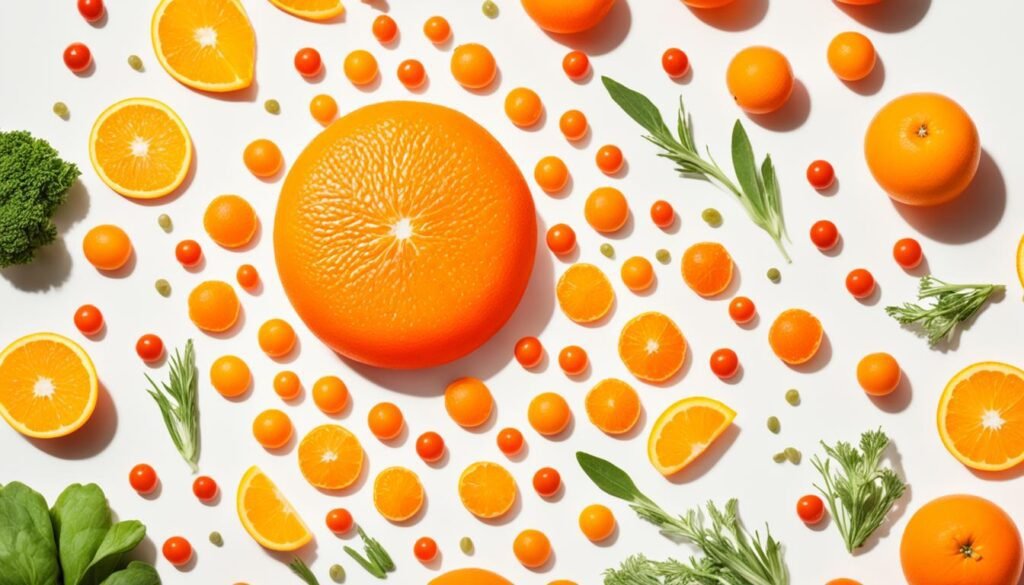
Crocin is a yellow carotenoid pigment found in saffron. It has powerful antioxidant properties and has been found to combat cellular damage and reduce inflammation in the body. One of the notable benefits of crocin is its ability to protect against age-related cognitive decline. Research suggests that crocin can help maintain brain health and prevent cognitive decline associated with aging.
Additionally, crocin has shown potential in preventing aging in human skin cells. It reduces inflammation and protects against damage caused by UV light, which can contribute to premature aging of the skin. By incorporating crocin into your skincare routine, you can help combat signs of aging and promote a healthier, more youthful complexion.
While saffron, the natural source of crocin, is a highly sought-after and expensive spice, you can still experience the benefits of crocin through concentrated saffron supplements. These supplements offer a more cost-effective option while providing the essential compounds, including crocin, that promote overall health and well-being.
The Benefits of Crocin:
- Combat cellular damage
- Reduce inflammation
- Protect against age-related cognitive decline
- Prevent aging in human skin cells
- Protect against damage caused by UV light
Vitamin C
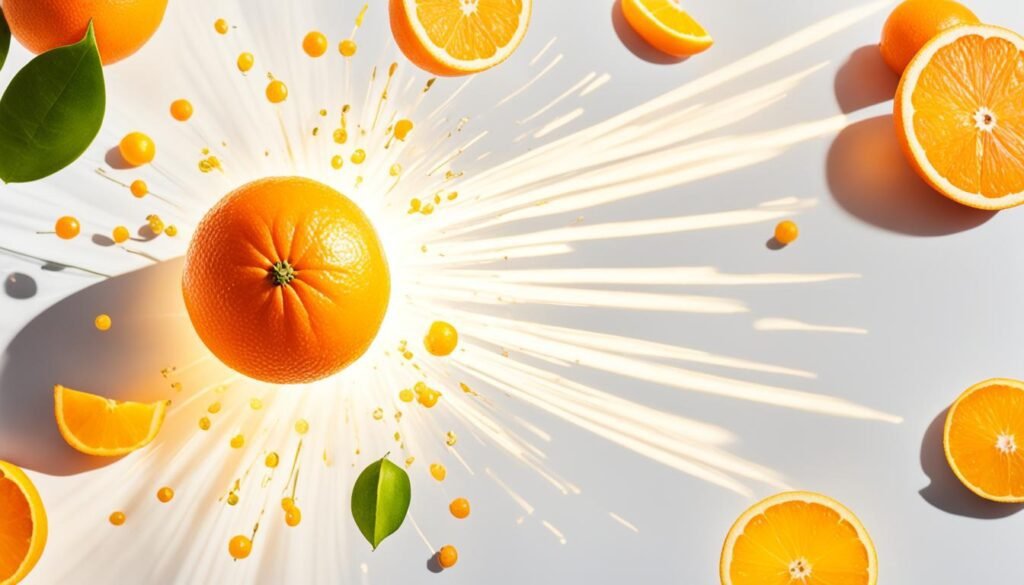
Vitamin C is an essential nutrient that plays a crucial role in supporting healthy aging. As a powerful antioxidant, it protects cells from oxidative damage caused by free radicals, which can accelerate the aging process. This vitamin has numerous benefits for the skin, including improving hydration, stimulating collagen production, and protecting against the harmful effects of sun exposure.
One of the key functions of Vitamin C is its ability to improve skin hydration. It helps to retain moisture in the skin, preventing dryness and promoting a radiant, youthful complexion. By maintaining adequate moisture levels, Vitamin C helps to plump up the skin, reducing the appearance of fine lines and wrinkles.
Additionally, Vitamin C is known for its role in stimulating collagen production. Collagen is a protein that provides structure and elasticity to the skin. As we age, collagen production naturally declines, leading to sagging skin and the formation of wrinkles. By incorporating Vitamin C into your skincare routine, you can boost collagen synthesis and improve skin firmness and elasticity.
In addition to its hydrating and collagen-boosting properties, Vitamin C offers protection against sun exposure. Ultraviolet (UV) radiation from the sun is a major contributor to premature skin aging. Vitamin C acts as a natural defense mechanism, neutralizing free radicals generated by UV exposure and reducing the risk of sunburn and other sun damage.
To ensure sufficient intake of Vitamin C, it is advisable to consume a diet rich in vitamin C-containing foods, such as citrus fruits, strawberries, kiwi, peppers, and leafy greens. However, as vitamin C levels tend to be lower in older adults, supplementation may be necessary to achieve optimal levels.
Including Vitamin C in your skincare routine can help protect against premature aging, improve skin hydration, stimulate collagen production, and safeguard against the damaging effects of sun exposure. Whether through dietary sources or supplements, Vitamin C is a valuable addition to any anti-aging skincare regimen.
| Benefits of Vitamin C for Anti-Aging Skincare |
|---|
| Improves skin hydration |
| Stimulates collagen production |
| Protects against sun exposure |
Vitamin E

Vitamin E is an important antioxidant that plays a crucial role in protecting cell membranes and preventing damage to enzymes associated with them. It supports immune function and helps regulate inflammation, making it a vital nutrient for overall health and well-being.
One of the key benefits of vitamin E is its ability to reduce sun damage to the skin. When exposed to the sun’s harmful UV rays, our skin can experience oxidative stress and cellular damage. Vitamin E, with its antioxidant properties, can help protect the skin from these damaging effects, reducing the risk of sunburn and skin aging.
In addition to its skincare benefits, vitamin E also has a positive impact on heart health. It has been shown to improve the function of blood vessels, reduce inflammation in the arteries, and prevent the oxidation of LDL cholesterol – all factors that contribute to better heart health and a reduced risk of cardiovascular diseases.
The Benefits of Vitamin E
Vitamin E offers several benefits for antiaging skincare and overall well-being:
- Antioxidant Protection: As an antioxidant, vitamin E neutralizes free radicals, protecting the body’s cells and tissues from oxidative damage.
- Cell Membrane Protection: Vitamin E helps protect cell membranes from damage, ensuring their proper function and integrity.
- Reduced Sun Damage: Applying vitamin E topically or consuming it through diet or supplements can help reduce the risk of sunburn and protect the skin from UV-induced skin aging.
- Improved Heart Health: Vitamin E supports heart health by improving blood vessel function, reducing inflammation, and preventing the oxidation of LDL cholesterol.
To incorporate vitamin E into your skincare routine, you can consume foods rich in vitamin E, such as nuts, seeds, vegetable oils, and green leafy vegetables. Additionally, you can use topical skincare products that contain vitamin E or take vitamin E supplements in recommended doses.
| Food Sources of Vitamin E | Vitamin E Content (per 100g) |
|---|---|
| Almonds | 26.2mg |
| Sunflower seeds | 35.17mg |
| Avocado | 2.07mg |
| Spinach | 2.03mg |
| Broccoli | 0.78mg |
The antioxidant properties of vitamin E make it an essential nutrient for protecting cell membranes and reducing the risk of sun damage to the skin. Incorporating vitamin E into your skincare routine can help promote a youthful, radiant complexion and improve overall heart health.
Other Anti-Aging Supplements
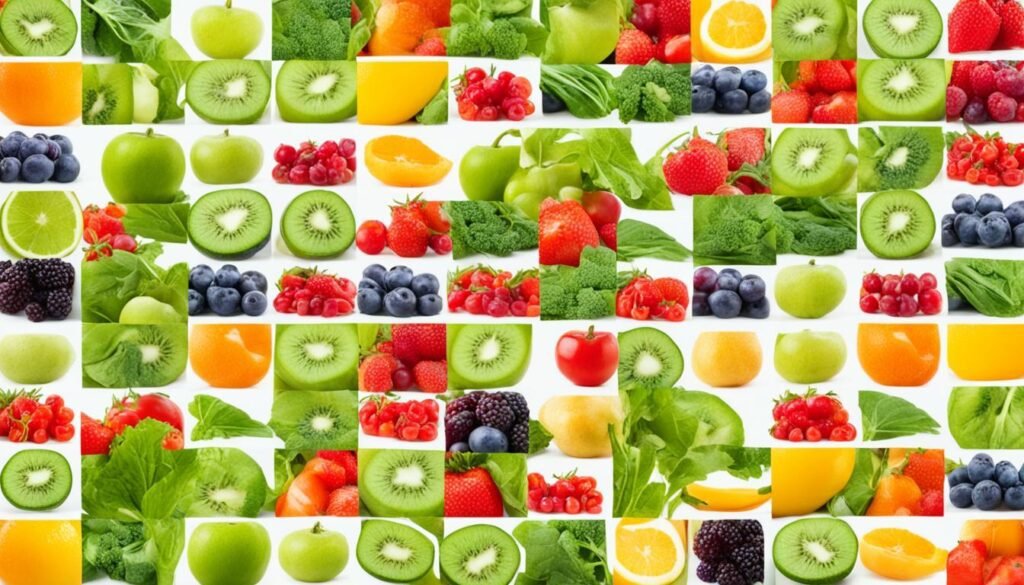
In addition to the key vitamins discussed, there are other supplements that have shown potential in supporting healthy aging. Vitamin E, theanine, resveratrol, zinc, curcumin, and selenium all have anti-aging benefits.
Vitamin E plays a role in immune function and inflammation regulation. It is an important antioxidant that protects cell membranes and prevents damage to enzymes associated with them. Supplementing with vitamin E can reduce sun damage, limit the production of cancer-causing cells, and improve heart health.
Theanine, an amino acid found in tea leaves, has been shown to improve brain function and promote a sense of calmness and relaxation.
Resveratrol, a compound found in red wine and grapes, has protective effects against UV-induced skin aging and may offer cardiovascular benefits.
Zinc is an essential mineral that promotes healthy hair growth and supports the immune system.
Curcumin, the active compound in turmeric, has anti-inflammatory and antioxidant properties that may enhance cognition and memory.
Selenium is a trace mineral that has been associated with longevity and has antioxidant effects.
Incorporating these supplements into your skincare routine may offer additional anti-aging benefits. Consult with a healthcare professional to determine the appropriate dosage and form of these supplements for your specific needs.
Conclusion
Incorporating key vitamins into your skincare routine can greatly benefit your anti-aging efforts. Curcumin, EGCG, collagen, CoQ10, nicotinamide riboside, nicotinamide mononucleotide, crocin, vitamin C, vitamin E, and other supplements have shown promising results in supporting healthy aging and rejuvenating the skin. These vitamins and supplements can improve skin hydration, stimulate collagen production, protect against sun damage, reduce wrinkles, and promote a youthful, radiant glow.
By nourishing your skin with these essential vitamins, you can enhance its overall health and appearance, resulting in a more youthful and vibrant complexion. However, it is important to consult with a healthcare professional before starting any new supplement regimen, as individual needs may vary. They can provide personalized advice based on your specific concerns and medical history.
Remember, anti-aging skincare is a holistic approach that combines the right vitamins with a balanced diet, regular exercise, proper hydration, and a consistent skincare routine. By incorporating key vitamins and adopting a healthy lifestyle, you can achieve and maintain youthful skin, reduce the appearance of wrinkles, and enjoy a radiant glow that reflects your inner vitality.
FAQ
What are the key vitamins for antiaging skincare?
The key vitamins for antiaging skincare include curcumin, EGCG, collagen, CoQ10, nicotinamide riboside, nicotinamide mononucleotide, crocin, vitamin C, and vitamin E.
How does curcumin benefit antiaging skincare?
Curcumin, found in turmeric, has powerful cellular protective properties, acts as an antioxidant, delays cellular senescence, and promotes longevity. It also combats cellular damage and reduces the risk of age-related cognitive decline.
What are the benefits of EGCG for antiaging skincare?
EGCG, found in green tea, improves mitochondrial function, protects against aging skin, reduces hyperpigmentation caused by UV light, and may suppress brain aging and reduce stress.
How does collagen help in reducing signs of aging?
Collagen is a protein that helps maintain skin structure. Supplementing with collagen reduces signs of aging, such as wrinkles and dry skin, improves skin hydration, elasticity, and nail growth.
What are the benefits of CoQ10 for antiaging skincare?
CoQ10, an antioxidant naturally produced by the body, improves overall quality of life, reduces hospital visits, slows physical and mental deterioration in older adults, and reduces oxidative stress. It also benefits heart health by lowering blood pressure, reducing arterial stiffness, and preventing cholesterol buildup.
How do nicotinamide riboside and nicotinamide mononucleotide support healthy aging?
These supplements are precursors to NAD+, a compound critical for energy metabolism, DNA repair, and gene expression. Supplementation with nicotinamide riboside and nicotinamide mononucleotide has shown potential in restoring NAD+ levels, preventing age-associated genetic changes, and improving muscle function.
What are the benefits of crocin for antiaging skincare?
Crocin, found in saffron, combats cellular damage, reduces inflammation, protects against age-related cognitive decline, and prevents aging in human skin cells by reducing inflammation and protecting against damage caused by UV light.
How does vitamin C promote antiaging skincare?
Vitamin C is a powerful antioxidant that protects cells from oxidative damage, improves skin hydration, stimulates collagen production, and safeguards against wrinkle development and premature aging caused by sun exposure.
What are the benefits of vitamin E for antiaging skincare?
Vitamin E is an important antioxidant that protects cell membranes, prevents damage to associated enzymes, reduces sun damage, limits the production of cancer-causing cells, and improves heart health.
Are there other supplements that support healthy aging?
Yes, in addition to the key vitamins, other supplements like theanine, resveratrol, zinc, curcumin, and selenium have anti-aging benefits. These supplements improve brain function, protect against UV-induced skin aging, promote healthy hair growth, enhance cognition and memory, and have been associated with longevity.
How can I incorporate these key vitamins into my skincare routine?
To incorporate these key vitamins, you can use turmeric in cooking or take turmeric supplements for curcumin, drink green tea or take green tea extract supplements for EGCG, use collagen supplements in various forms, and include CoQ10, nicotinamide riboside, nicotinamide mononucleotide, crocin, vitamin C, and vitamin E supplements in your skincare routine. Remember to consult with a healthcare professional before starting any new supplement regimen.
What are the benefits of including these key vitamins in my skincare routine?
Including these key vitamins in your skincare routine can improve skin hydration, stimulate collagen production, protect against sun damage, reduce wrinkles, and promote a youthful, radiant glow.

